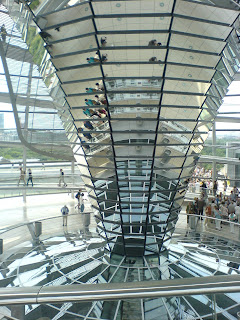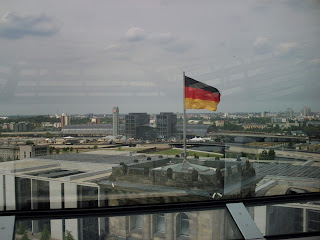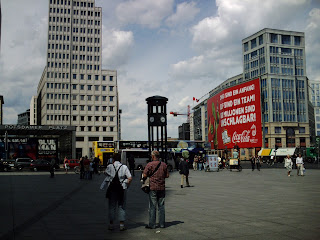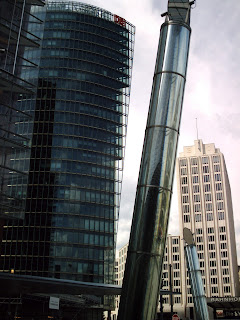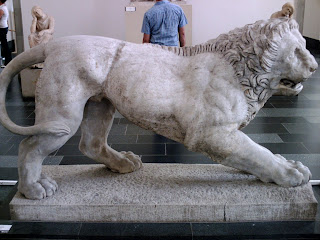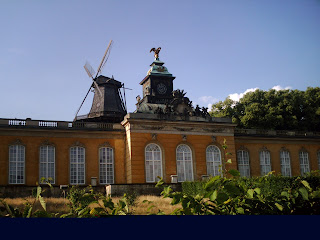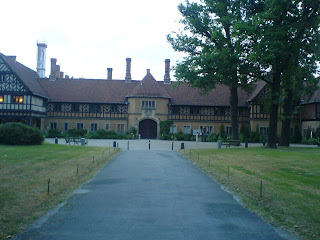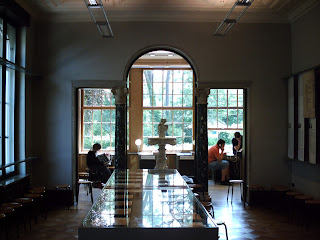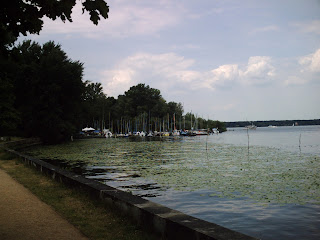Berlin
Berlin is a great visit, another hip, hop and happening
kinda place, an octopus of culture, history, architecture and buzzing activity.
Now it’s an established united city you can stay in the old eastern part as I
did, in the most concrete bloc type hotel I have ever stayed in, yet it was comfortable
and friendly enough. The centre of Berlin covers a very large area and is pleasantly interspersed by swathes of green space which separate different shopping, entertainment and business districts. LIke in many places, sometimes it's best just to wander and see what you come across.
Here is a really cool map of Berlin, clear, interactive and user friendly to help you get around!
To negotiate this metropolis a 'must have' is a standard travelcard (Berlin Welcome Card) which lasts for 48 or 72 hours or even five days, and gives you carte blanche to travel on trams,
urban rail, underground and buses. You really have to have one to do yourself justice. Berlin has a
super duper transport network which runs very efficiently as you can imagine. It’s
the usual mixture of old and new. Old workhorse stations like Berlin Zoo, Friedrichstrasse and
Alexanderplatz jostle with their brash new brother, the Hauptbahnhof central station, the space age main Berlin
rail terminus with shops as well which carries trains on three levels and has a straight through
set of platforms for the big intercity expresses.The Hauptbahnhof, a new edifice of steel and glass stands somewhat apart from the centre across open ground, with a raised track on which you can see slick intercities creeping in and out of the terminus like giant caterpillars Meanwhile you can travel locally on the S-Bahn, the city rail, or the U-Bahn, the subway.
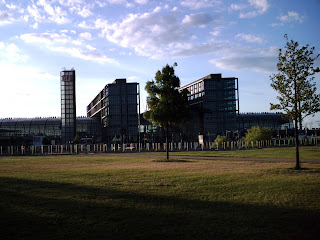 |
| Hauptbahnhof |
I caught the train every day from near my hotel in the eastern suburbs and headed straight into town. The track swathes through the centre of Berlin above street level so is a journey worth making on its own to get lots of cityscapes from different angles. and of course with the travel card you can get off and on at a whim. There are lots of open spaces across central Berlin which separate different centres within a centre. It reminds me a little of London with the City, West End, Kensington and so on.
Large open spaces near the Hauptbahnhof provide a fine setting for modern government buildings, the Federal Chancellery (1997-2001), the Paul Lobe building (1997-2001) and the Swiss Embassy, as well as the Reichstag.
Alexanderplatz is as open an urban space as you could want, dominated
by the big central overground railway station and the Alexanderplatz TV Tower, a
relic of the communist era and poking like a giant needle into the sky with its giant 'flower bulb' near the top. It is Berlin's highest building at 368m, and has a revolving restaurant and great views across the city. Down below, find a
bar or café here for lunch, you could do a lot worse. Just down the road from
here you reach the Brandenburg Gate (1788-1791), iconic symbol of Berlin and backdrop to
defining moments in the city’s history like when Ronald Reagan spoke there
encouraging Gorbachev to tear down the Iron Curtain. Also adjoining the Brandenburg Gate is the rebuilt Hotel Adlon (1995-97). You can see it in the background in the photo below.
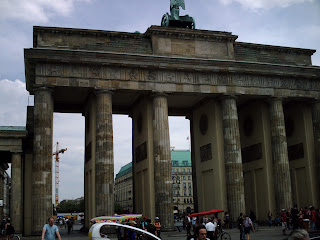 |
| Brandenburg Tor |
Just round the corner from the Brandenburg Gate is the Reichstag building, built between 1884 and 1894, a must see,
although probably worth an early start to avoid too long a queue. It has been the seat of the German Bundestag since 1999. A big brash classical building, it stands like a bullying brother dominating the buildings around. it really is seriously large with its four towers. It also stands at the eastern end of that elegant avenue, Unter Den Linden. Once you have negotiated the queue you can climb to the great glass dome at the top designed by Norman Foster and admire the all round views across the city including the government quarter. Well worth it!
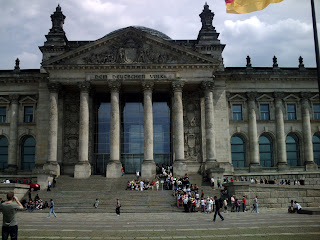 |
| Reichstag |
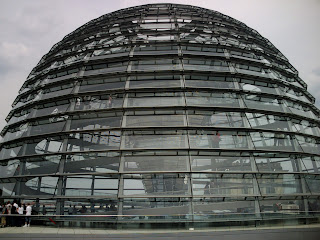 |
| Norman Foster Dome |
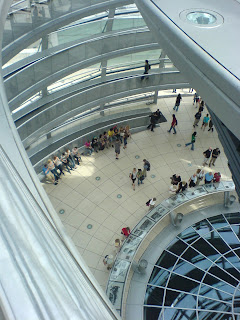 |
| Views from inside Reichstag dome |
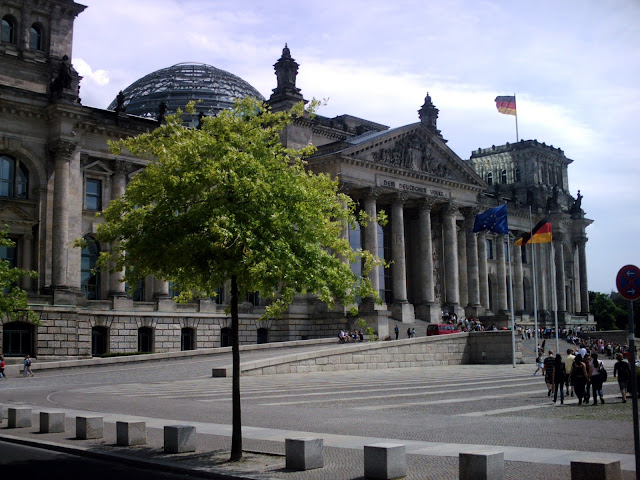 |
| The mighty Reichstag |
 |
| Yours truly at the Reichstag! |
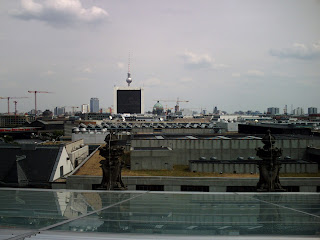 |
| Reichstag roof views |
You can also visit the ruins of Anhalter Bahnhof, the really big old
Berlin rail station that was meant to be a daddy of rail termini. Now there
is just a forlorn old frontage on the edge of a busy city street with no more
than a sign to signify its former glory.
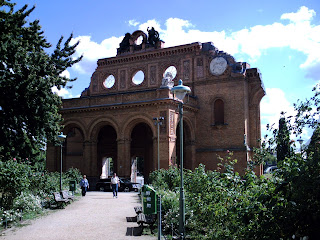 |
| What's left of Anhalter Bahnhof |
Traces of the Berlin Wall criss-cross the city and help you
swot up on your history. One section reaches Checkpoint Charlie down Friedrichstrasse, the famous
border crossing between the US and Soviet sections of the city from Cold War days, where you can take a photo of the booth and
visit the Berlin Wall Museum which tells you all about the former divided city.
 |
| Checkpoint Charlie |
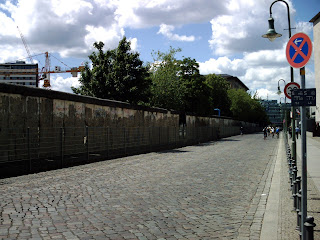 |
| Niederkirchner Strasse |
Nearby if you walk along the wall for a while in Niederkirchner Strasse you get to an
exhibition of the Nazi era (Topography of Terror exhibition ) which tells you all about the surrounding buildings
and how they all fitted into the Third Reich nerve centre.
Potsdammerplatz is a giant
confluence of city streets with concrete reaching to the heavens and gleaming
glass and reflections, including a state of the art shopping and eating emporium,
even here in the open spaces you can trace remnants of the Berlin Wall. Here is the Sony Complex (1996-2001) with a 103m high tower and roof shaped like a tent.
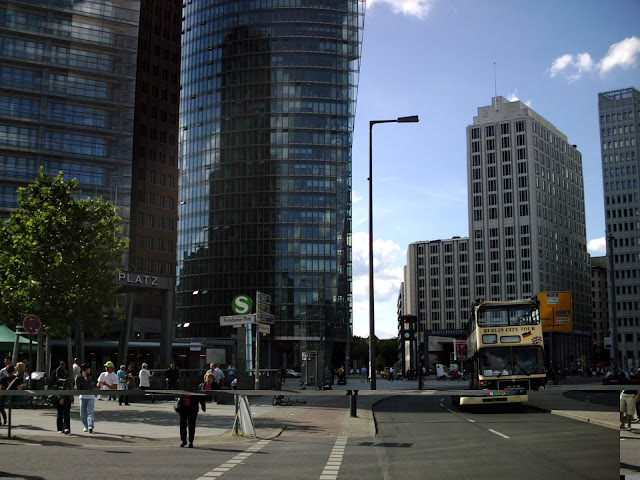 |
| Views of Potsdammerplatz |
Museum Island is worth a visit, a collection of classical
buildings between two arms of the river Spree and just to the north off that famous Berlin avenue with its wide
tree lined walkways, Unter Den LInden, which slices past its own clusters of classic buildings, including the Berliner Dom Cathedral.
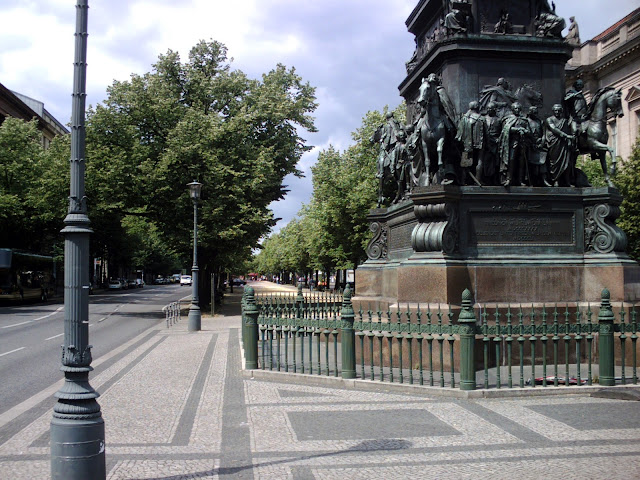 |
| The elegant Unter den Linden |
I visited the Pergamum Museum, lots to see if you are into
Egyptology and ancient cultures. Again the sort of place you might find Indie scanning
classical documents with a magnifying glass. All these places can be reached
easily by jumping on the nearest tram. Berlin Cathedral is near here, a former court and palace church built between 1894 and 1905. There are four other treasure filled museums at this point: the Bode Museum, the Old Museum, the Old National Gallery and the New Museum.
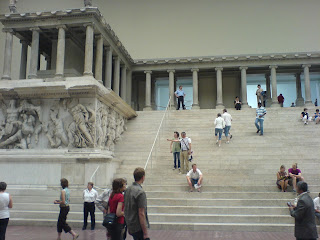 |
| Pergamum Museum |
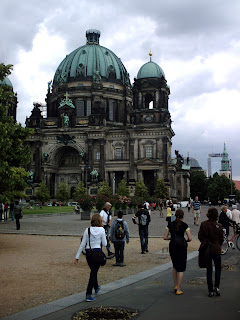 |
| Berlin Cathedral |
Kurfurstendamm is another iconic major central Berlin hub and a place to strut your stuff, get a bite to eat and wander the upmarket streets. Here is the famous Kaiser Wilhelm Memorial Church preserved as a reminder of the horrors of past war. Wander down the elegant Kurfurstendamm boulevard to soak up the vibes! Are you a posh shopper? Get down here as soon as possible!
I flew from the UK to Schoenefeld airport to the south east of the city, reached
easily by local rail, but in the old days it was Tempelhof airport that was an iconic entry
point for the German capital. Tempelhof Airport, now closed, is a short ride
from the city centre and well worth a visit. It’s closed as a functioning airport
now but was still operational when I visited. The main building is absolutely
humungous, one of the biggest buildings in the world when first built (it has
been in the top twenty) as a Nazi monstrosity in the thirties. It’s basically a
central hub with too massive wings flaying out in both directions and
encompassing the apron like the arms of a giant. I went into the old booking hall
which had a model of a 1930s airplane suspended from the ceiling. It was
virtually empty with just a little flight information on the boards, but if
Indiana Jones had walked in with his leather jacket and trademark hat, carrying
a case containing an Old Testament artefact, I wouldn’t have been surprised. You
can walk the perimeter of the airport if you fancy things like that, peering
through the fence at the old landing ground. I got to the airport on the
underground, and left on the overground at the southern end of the airport,
which takes you on a long curve back into the city.
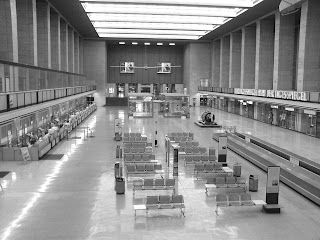 |
| Tempelhof booking hall |
I was looking forward to going to the Tiergarten, to the west of Unter Den LInden, a public park since 1742 and covering 207 hectares, which I’d
read about beforehand. I guess I was influenced by those images of Germans
drinking coffee in all their finery outdoors in elegant cafes in the pre- war days. When
you actually get there, it’s like a slice of countryside plonked right in the
middle of the city, with the natural look of pastoral meadows and woodland somewhere outside
the city. In fact it wasn’t too dissimilar to the slightly unkempt greenery
that surrounds the mega palaces of Potsdam, scattered over a vast parkland of
trees, shrubs and open grass. The Tiergarten is a pleasant change from the busy
city streets, walking through the trees and extensive meadows, stopping at an
open air café by the canal for a bite to eat. Over the canal is the Zoological Gardens, the Berlin Zoo and oldest German Zoo.
But finely manicured urban park this is not, unless I missed some of it! In London’s
Regents and Hyde Parks you find beautifully tended flower beds and more
evidence of a fleet of gardeners that ghost in to keep the place on song. The
Tiergarten is far more ‘wild,’ if I can use that word. But still very nice and pleasant! You also find the Siegesaulle (Victory Column) here topped with the goddess of victory.
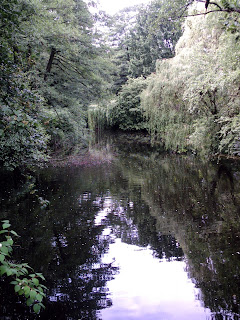 |
| Tiergarten |
Like I said, a Travelcard is a necessity, and another train ride out of the city 15 miles to the south west will take you to Potsdam, a gilded town of classical buildings and parkland full of palaces and stately homes. After alighting from the train you can catch the tram through the centre of Potsdam and on to the extensive parkland with more than enough room for everyone. Scattered across this area are various mansions and palaces of different style, size and colour, including the Sanssouci and Neues Palais palaces. Take your pick, there is a selection of them in the photos below.
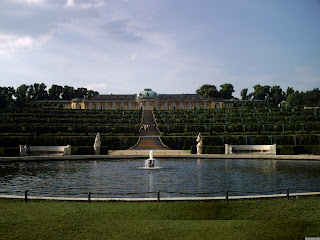 |
| Sanssouci Palace |
It is here also that you can take a longish walk to the Cecilienhof Palace, now a hotel where the 'BIg Three,' of Roosevelt, Churchill and Stalin met after the war to decide the fate of Europe at the Potsdam Conference. Things must have hardly changed in the last seventy years or so, the hotel is still surrounded by a quiet country park and is approached down a side road of sedate old mansions from a very different world.
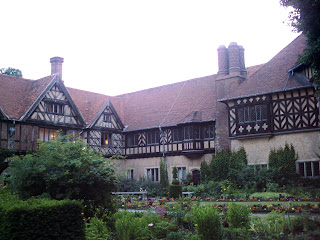 |
| Cecilienhof |
 |
| Neues Palais - the last palace that Frederick the Great had built in the park grounds |
The shadow of the Third Reich of course has left its unmistakeable
mark on the city. Right in the centre, near the site of Hitler’s bunker, there is a large open area created as a
memorial to the Jewish victims of the Holocaust (Memorial to the Murdered Jews of Europe). The Field of Stelae comprises 2711 concrete blocks.
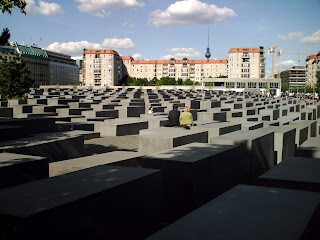 |
| Memorial to the Murdered Jews of Europe |
As well as city centre
reminders of the Nazi regime, there are also other trips that provide
illumination to this era. You can take the train out to the south west edge of
the city to Wannsee, now a vacation area for the city and very much leafy
suburb. Here you can find a large area of lake and the famous inland beach at
Wannsee. Over the water from the beach is the infamous Wannsee villa where the Nazis
arranged the ‘Final Solution.’
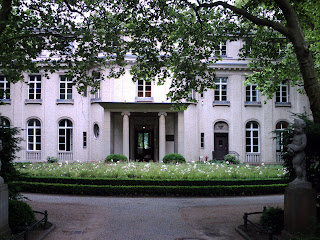 |
| Wannsee villa |
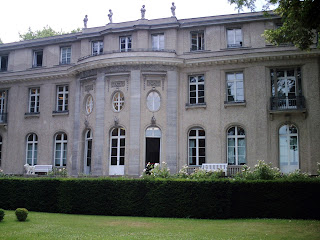 |
| Rear of Wannsee villa |
It is now an exhibition with rooms telling the story of the Final Solution and the meetings that took place
here. You can wander the gardens that fall down to the lakeside.
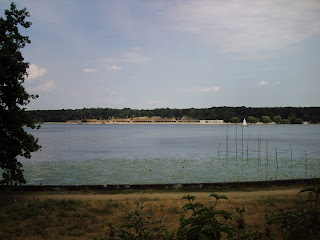 |
| Wannsee Beach opposite villa |
A trip by train to the northern edge of the city 22 miles from the centre will take
you to Sachsenhausen, a Third Reich concentration camp and model for other
concentration camps. It was the first new camp to be built after the appointment of Reichsfuhrer SS Heinrich Himmler as the German police chief in July 1936. Over 200,000, people were imprisoned here between 1936 and 1945. At first political prisoners were kept there, then later any group defined by National Socialist ideology as racially and biologically inferior, and after 1939 increasing numbers from occupied Europe. The camp was liberated by Soviet and Polish military on the 22/23rd April 1945. This site needs several hours and has a comprehensive
audio guide. It was part of a whole industrial complex concealed in a
residential suburb of Berlin. The camp itself was in the shape of a triangle
surrounded by high walls with the usual watchtowers. In the war the area would
have been covered in huts. Now there are just a few huts left, one with a large
exhibition and stairs down to a mortuary area from a medical centre. There is
also a pit area where executions were carried out. I would say you need three or four hours there to get your money's worth.
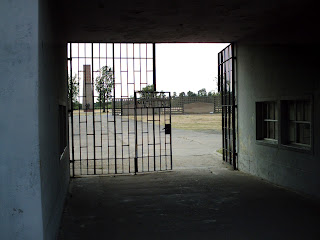
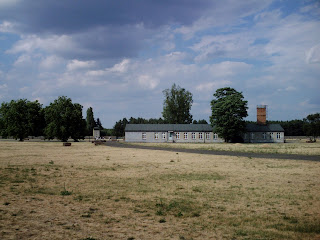
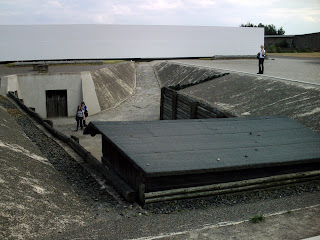 |
| Execution pit |
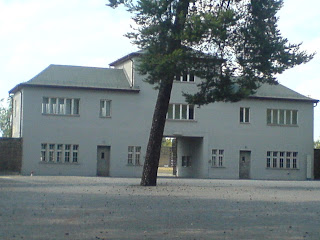 |
| Entrance to Sachsenhausen |
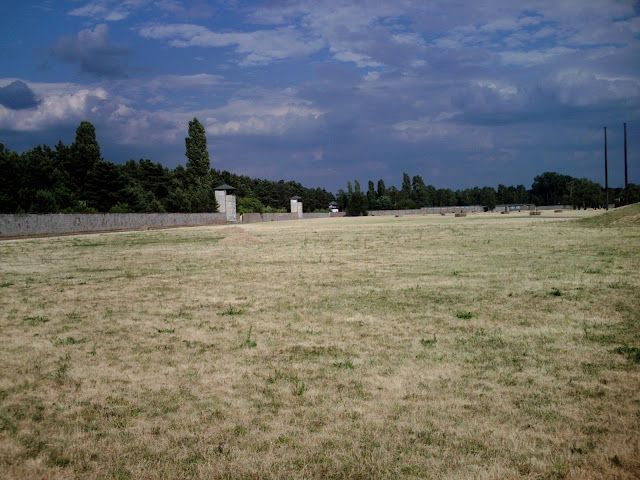 |
| Views of Sachsenhausen concentration camp |


























